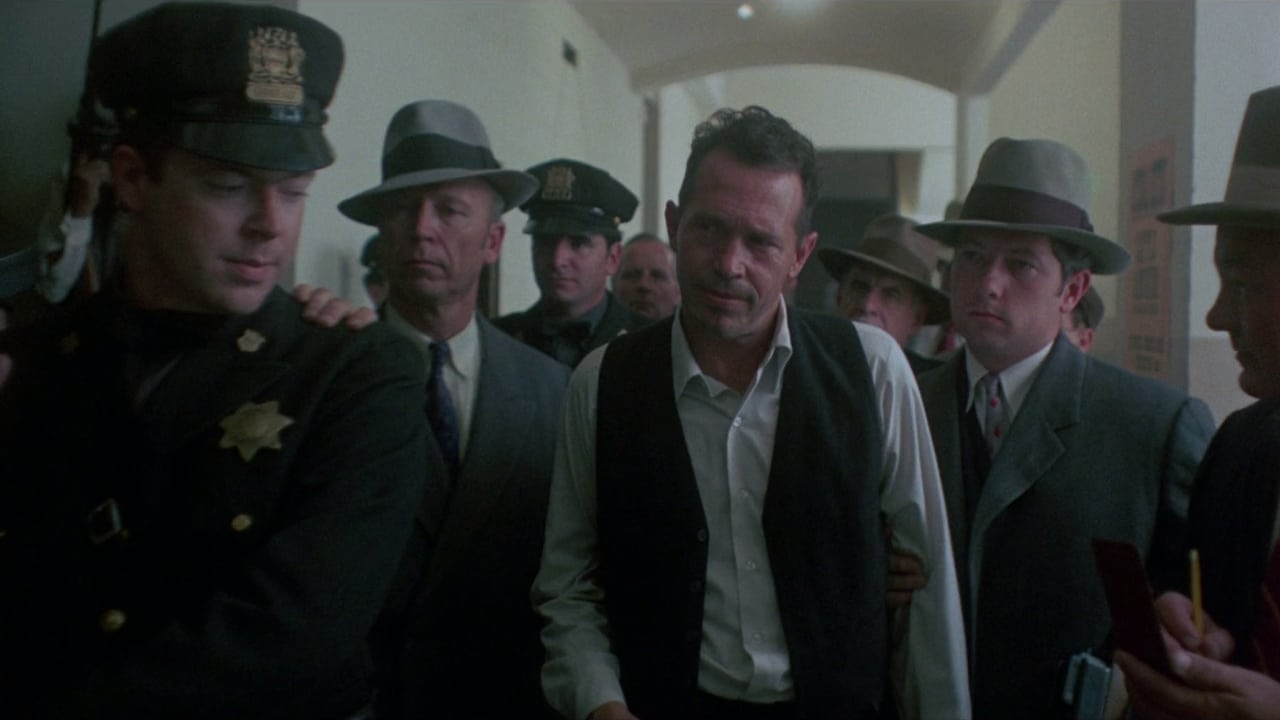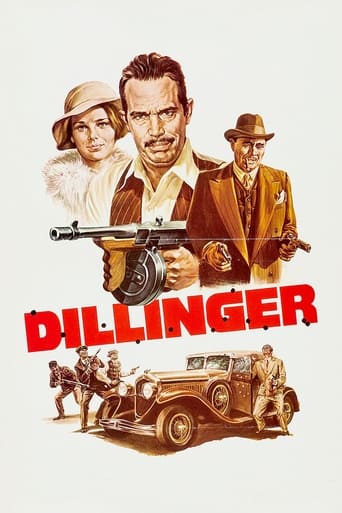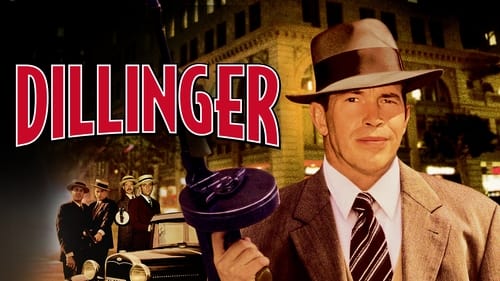



Tied for the best movie I have ever seen
That was an excellent one.
n my opinion it was a great movie with some interesting elements, even though having some plot holes and the ending probably was just too messy and crammed together, but still fun to watch and not your casual movie that is similar to all other ones.
View MoreExcellent characters with emotional depth. My wife, daughter and granddaughter all enjoyed it...and me, too! Very good movie! You won't be disappointed.
View MoreBen Johnson is 'Melvin Purvis, G-man' and Warren Oates is 'public enemy number one' in this violent, fedora-rich biopic that takes some liberties with the facts. The film follows John Dillinger's rise from bank robber to criminal icon, portraying him as violent and vain, but also an anti-hero to some poor depression-era Americans (similar to the superior "Bonnie and Clyde", 1967). The rest of the gang is a bit of a 'who's who' of period gangsters: Pretty-boy Floyd, Baby Face Nelson, Machine Gun Kelly, etc. Oates and Johnson (the Gorch brothers in Peckinpah's great "The Wild Bunch", 1969) are quite good in their roles, as are the rest of the cast except for a hammy Richard Dreyfuss as Baby Face Nelson. As Billie Frechette, Dillinger's moll, Michelle Phillips (of 'The Mamas & the Papas' fame) seems like a bit of gimmick casting and she certainly does not look 'half Indian', which, as is mentioned several times in the film, Frechette was. Typical of the trend in late '60's/early '70's R-rated action films, lots of blood-squibs were used, so the shootouts are quite messy and 'realistic'. Many of the gang-members' demises are fictionalised to allow Purvis to be pulling the trigger (or at least be on hand), and while I appreciate that movies are not meant to be history lessons, I dislike it when they rewrite the past for simplistic dramatic effect. Not a great gangster film, but entertaining enough to warrant a viewing, especially by fans of the genre. One interesting side-note: Oates actually resembles Dillinger. No mention is made of Dillinger's mythic monstrous member, which urban-legend states is in the custody of the Smithsonian.
View MoreAs primarily character actors, you don't get many chances to catch Warren Oates and Ben Johnson at the top of a bill, but they get the opportunity here in this Seventies gangster romp featuring many of the top hoodlum names of the era. My instincts tell me that most of this story was probably fictitious, and without the time or inclination to check out the details, I'll just say that it was an entertaining flick if you go for this kind of stuff.The film opens with an 'Introducing' Michelle Phillips credit, an early picture for the former Mamas and Papas singer. Though third billed right after the nominal stars of the picture, I didn't get a sense that she had a major impact on the story, even though she wound up as John Dillinger's (Oates) moll following his virtual kidnap of her in a run down barroom. She certainly didn't find herself in league with the era's infamous Bonnie and Clyde pair, though she did manage to squeeze off a few effective machine gun rounds in the latter part of the story.There's some interesting casting for Dillinger's associates, folks like Harry Dean Stanton as Homer Van Meter, Geoffrey Lewis as Harry Pierpont, and a young Richard Dreyfuss aptly chosen as Lester 'Baby Face' Nelson. That scene where Dillinger works over the fresh mouthed Nelson was one of those instances that didn't ring true to me. If it happened, I'm surprised Nelson would have stuck around.The coolest scene in my estimation took place right after Dillinger maneuvered his way out of the Lake County Jail, freeing Reed Youngblood (Frank McRae) and grabbing a guard and the warden for a brief period as hostages. As they make good their escape, Dillinger has his driver pull over so he can rob a bank! That I believe, is what they call chutzpah!
View MoreThe 1973 film version of the (criminal) life of notorious bank robber John Dillinger, not really a remake of the 1945 film of the same title but a re-imagining of its eponymous character's career in crime, is hugely entertaining, featuring a star turn performance from Warren Oates that shows that the actor had major star potential, hampered, sadly, by his short stature, which doesn't really figure in the film as its director, John Milius, manages somehow to make Oates look taller than he was.Allegedly made on the cheap by American-International, it doesn't look cheap to me. It has, in its modest way, a kind of epic sweep, as we see Dillinger and his gang move through the Midwest like a tornado. The supporting roles are mostly played by young, at the time unknown players, one of which, Richard Dreyfuss, strangely well cast as Baby Face Nelson, went on to a starring career. As Dillinger's squeeze, Michelle Phillips is surprisingly effective and very sexy. There's good work, too, from Steve Kanaly and, especially, Harry Dean Stanton, who plays the most likable of the Dillinger gang.A problem I have with the film, and it's a fairly big one, is Ben Johnson's performance as FBI man Melvin Purvis. A former stunt man, Johnson became an accomplished player in western films, had a fine, mellow voice and a pleasing presence. He was not, however, a versatile actor, and this hurts Dillinger, as Johnson has the second biggest part in the film, and director Milius seems to favor him. Johnson looks his age, well past fifty at the time, and doesn't strike me as trim enough to be an FBI man. But if he was otherwise good casting this could be overlooked. Johnson simply lacks the authority, the heroic presence, to be Dillinger's nemesis, especially Dillinger as electrifying played by Warren Oates. Johnson was an actor who could steal scenes from major stars, hold his own with the best of them; and yet when "handed" scene after scene in Dillinger he just doesn't measure up. Worse, he often comes off as smug when what he should really be conveying is confidence, competence at what he does.With better casting in the Purvis role this Dillinger might have been a classic. As it is, it's excellent. The action scenes are done to perfection, nearly choreographed, I suspect, and yet they feel real none the less. There isn't a wasted moment in the film. Indeed, it could have been longer and worked just as well, maybe even better. The characters could have been more fleshed out; and some sections in the film, the one in the gang's Little Bohemia retreat in particular, could, with more time, greatly enhanced this already very well made film. John Milius was on a roll when he made this one, never fulfilled his potential. I wonder what went wrong.
View MoreThis is still the definitive biography of John Dillinger on film. I just saw Mann's Public Enemies - this film blows that one away. Forgive me for quoting my own review of Mann's film: "Milius, taking his cue from "Bonnie And Clyde," from the earlier Lawrence Tierney film "Dillinger," and from the gaudy gangster films of Roger Corman, fashioned a film that was both flashy yet homespun, part unabashed B-movie, part evocation of American Gothic. Even his occasional tinkering with historical accuracy could be forgiven, since it was clear he had a firm grasp on what the Dillinger phenomenon was really all about - 'farm boy makes good by turning bad' is an undeniable folk-theme of American life. And the brilliance of Warren Oates' performance in the Milius film is that Oates plays Dillinger like a runaway farm-boy with a sense of humor and a quick temper, who just happened to rob banks for a living. That's as much as you can give any professional criminal without lying about the nature of crime namely, it's about stealing other peoples' money and hurting many of them in the process." Other reviewers have remarked this as a B-movie - but it is intentionally so, it never makes any pretense otherwise; and that's important: having decided to make a B-movie leaves Milius with considerable leeway as to how far he wants to push any aspect of the material. So while it's hard to think of any particular dramatic high-point of the film (perhaps the scene where Dillinger and Purvis go to the same restaurant, or the death of Pretty Boy Floyd?), it's much harder to find any moment that really drags the film down - the pacing of the film is that of a B-movie, it moves! There's nothing exceptional about the cinematography or music, or production design; what we're left with are memorable performances by some of the greatest character actors in cinema at the time, and an exciting story with enough savvy to trigger our emotions.Milius watched the Lawrence Tierney "Dillinger" and learned from it before starting this film; Mann should have watched Milius' film over and over before starting "Public Enemies." In any event, this is still THE Dillinger story, and and an entertaining action film as well.
View More